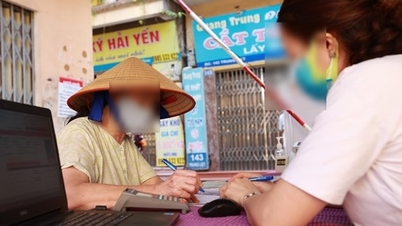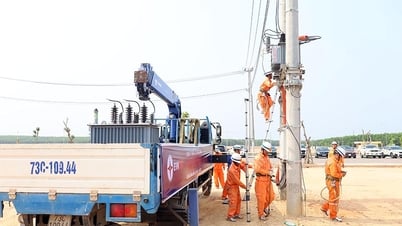Recognizing the nature of "social justice" in the capitalist mode of production
According to Marxism-Leninism, social justice ultimately depends on ownership relations. In other words, equity in ownership relations is the foundation of social justice. Marxist classics have exposed the nature of so-called social justice in the capitalist mode of production. In essence, it is a justice reserved only for the few who hold the right to private ownership of the means of production in capitalist society.
Capitalist society is based on the private ownership of the means of production, which means it contains and establishes the dominant position of unequal ownership of the means of production, which naturally leads to inequality in the distribution of “input” resources and “output” results of the development process. It cannot move towards ensuring true social justice.
The history of the development of capitalism as well as the process of resolving crises under the capitalist regime shows that the development of the capitalist market economy is always associated with the management, administration, and even the brutal intervention of the bourgeois state in economic processes, to ensure the implementation of the ultimate goals of satisfying the interests of capitalists and the interests of the bourgeoisie.

Illustration photo: VNA
In the first decades of the 21st century, capitalism has made adjustments and adaptations through implementing a number of changes in the ownership regime, production management organization and distribution through social welfare funds. From there, there has been a process of materializing the working class, and a number of new forms of management and distribution organization have emerged. Those adjustments and adaptations have given rise to new theoretical and practical issues that Marxism-Leninism, due to historical conditions, could not address fully and comprehensively. This has led some people to mistakenly believe that capitalism no longer exploits, that its nature has changed; that capitalism will automatically develop into socialism.
However, the limit of adaptive transformation of capitalism cannot overcome the private ownership of means of production. Under the pressure from the struggle of the working class and working people, capitalists were forced to transform private capital into collective capital, forming joint stock companies. This is a way to mobilize capital, create accumulation, concentrate capital, helping capitalists gain an advantage in competition. It allows some workers with idle money to invest in production through shares, stocks and collect interest and dividends. But that cannot eliminate the profits that capitalists gain through exploiting surplus value. Because in reality, the working class, the workers only hold a very small percentage of shares and stocks. Therefore, adjustments and adaptations do not change the exploitative and unjust nature of capitalism.
The nature of capitalist political systems following the Western formula of “liberal democracy”, as General Secretary Nguyen Phu Trong pointed out, is a democracy that protects the status and interests of the bourgeoisie minority. There, “a very small group, even just 1% of the population, but holds the majority of wealth, means of production, controls up to 3/4 of financial resources, knowledge and the main means of mass communication and therefore dominates the whole society... The proclamation of equality of rights, but not accompanied by equality of conditions to exercise those rights, has led to democracy remaining only in form, empty and without substance” (1) . Ultimately, the increasing injustices in capitalist society are the negative consequences of the development of the capitalist mode of production and political regime.
Social justice in Vietnam is “leaving no one behind”
Loyal to and creatively developing Marxism-Leninism, our Party has developed the theory of the socialist-oriented market economy development model to move towards the goal of socialism, including ensuring social justice. Our Party affirms that implementing social justice is not only a goal but also becomes a driving force, that is, an intrinsic element of economic development, so that each step of economic development is a step towards implementing social justice. That is the unique and superior feature of the economic regime that our country is building.
The reason why we need to orientate socialism in a market economy is because the market economy only contributes to social justice within the limits of market rules, distributing profits based on labor, economic efficiency and capital contribution. Accordingly, those who contribute more will enjoy more, those who contribute less will enjoy less. The market economy itself cannot completely solve social injustice problems. To overcome the "failures" of the market in achieving social justice goals, the "invisible hand" of the market economy must be linked to the "visible hand" of the state. In other words, in Vietnam, a socialist-oriented market economy is inevitable to be able to promote the advantages and overcome the limitations of the market economy in achieving social justice goals.
To effectively implement social justice, our Party clearly states that the basic condition is to ensure fairness in distribution. Accordingly, the distribution regime is implemented mainly based on labor results, economic efficiency, and at the same time according to the level of capital contribution and other resources, and distributed through the social security and welfare system. Thus, distribution is implemented according to the law of market economy, and distribution is implemented according to social welfare and social security to ensure social justice. Implementing the distribution regime mainly based on labor results, economic efficiency, and at the same time according to the level of capital contribution (market economy) is aimed at respecting objective economic laws, liberating productive forces, opening up and promoting all creative potentials and subjective capacities of each person. At the same time and together with that, implement distribution through other resources and through the social security and social welfare system (socialist orientation) to ensure the possible level of equality for vulnerable and disadvantaged groups in society.
The method of distributing resources according to other resources through the social security and social welfare system overcomes the crucial weaknesses of the market economy, and adjusts the market economy to serve the goals of socialism. It is also a method to both develop the economy strongly and "harmoniously resolve social relations, control social stratification and promptly and effectively handle risks, contradictions and social conflicts, ensure social order and safety, protect the legitimate and legal rights and interests of the people" (2) ensure social security, social welfare, and prevent spontaneous trends of deviating from the economic development trajectory. Only then can the practicality and sustainability of the socio-economic development policy be ensured, and economic development and social justice be properly implemented.
Currently, Vietnam is considered by the world as one of the typical countries in sustainable multidimensional poverty reduction, effective investment in health care, education, culture, employment, ecological environment development, social security improvement, social welfare assurance, not only making the economy develop but also ensuring good implementation of social justice. After nearly 10 years of implementing Resolution 5 of the Central Committee (11th tenure) on a number of social policy issues for the period 2012-2020, all targets have been achieved and exceeded the targets set by the resolution. Of the total 26 targets, 5 targets were exceeded and completed ahead of schedule; 16 targets were achieved by 2020. The poverty rate from nearly 60% in 1986 decreased to less than 3% in 2022; Gross domestic product (GDP) per capita increased from 86 USD in 1986 to 4,110 USD in 2022. People have increasingly better access to basic social services, such as housing. By 2020, the State had supported housing for 648,000 poor rural households and 323,000 houses for the poor and people in difficult circumstances. During the 3 years of preventing and fighting the Covid-19 pandemic (2020-2022), the Government and all levels, sectors and localities have supported more than 120,000 billion VND and over 200,000 tons of rice to support more than 68 million people and workers in difficulty. Currently, there are over 1.2 million meritorious people and their relatives enjoying monthly preferential treatment; 98.6% of meritorious people's families have a standard of living equal to or higher than the average standard of living in the area.
The United Nations has also recognized Vietnam as one of the leading countries in realizing the millennium goals. The achievements have affirmed the good and superior nature of the socialist social regime that we are building. Our Party and State have repeatedly affirmed the consistent viewpoint: The people are the center, the subject of socio-economic development, and at the same time the direct beneficiaries of the achievements of socio-economic development, leaving no one behind.
To ensure social justice in the socialist-oriented market economy in Vietnam, the Resolution of the 13th National Congress continues to advocate promoting economic development in conjunction with social justice; harmoniously handling the relationship between economic development and social progress and justice in each step and each development policy. Focus on perfecting distribution relations, encouraging legitimate enrichment, effectively implementing correct social policies, creating strong motivation to promote all potentials and creativity of people. Ensure the practicality, stability, sustainability and suitability of social policies, create favorable locations and resources for economic development.
In conclusion, the perception of social justice in the socialist-oriented market economy in Vietnam today needs to have an objective, historical and specific perspective in assessment, not falling into the one-sided, distorted, and erroneous views and political schemes of "democrats", "human rights" activists, those who "borrow" the pretext of fighting for social justice and progress with the aim of opposing the Party, the State and the socialist regime. Only from such a perspective can we compare and evaluate achievements, affirm the superiority in economic development and growth with social progress and justice in our country today.
-----------
(1) Nguyen Phu Trong, "Some theoretical and practical issues on socialism and the path to socialism in Vietnam", National Political Publishing House Truth, Hanoi, 2022, p.21.
(2) Communist Party of Vietnam, "Documents of the 13th National Congress of Delegates", National Political Publishing House Truth, Hanoi, 2021, volume 1, p.148.
Source



![[Photo] Prime Minister Pham Minh Chinh receives Swedish Minister of International Development Cooperation and Foreign Trade](https://vphoto.vietnam.vn/thumb/1200x675/vietnam/resource/IMAGE/2025/5/12/ae50d0bb57584fd1bbe1cd77d9ad6d97)
![[Photo] Prime Minister Pham Minh Chinh works with the Standing Committee of Thai Binh Provincial Party Committee](https://vphoto.vietnam.vn/thumb/1200x675/vietnam/resource/IMAGE/2025/5/12/f514ab990c544e05a446f77bba59c7d1)
![[Photo] Prime Minister Pham Minh Chinh starts construction of vital highway through Thai Binh and Nam Dinh](https://vphoto.vietnam.vn/thumb/1200x675/vietnam/resource/IMAGE/2025/5/12/52d98584ccea4c8dbf7c7f7484433af5)





























































































Comment (0)